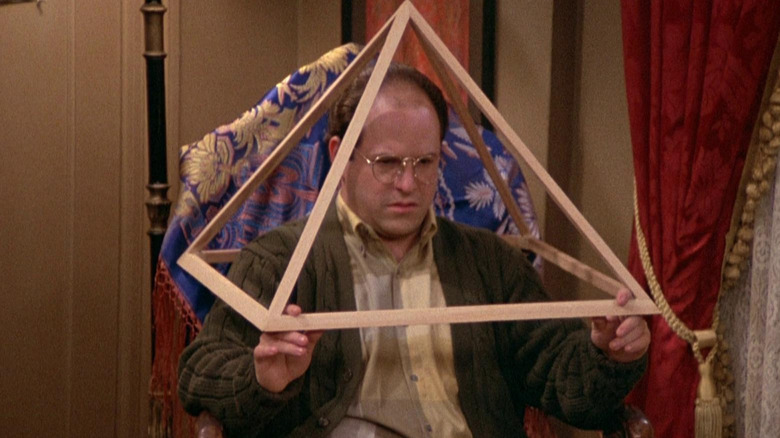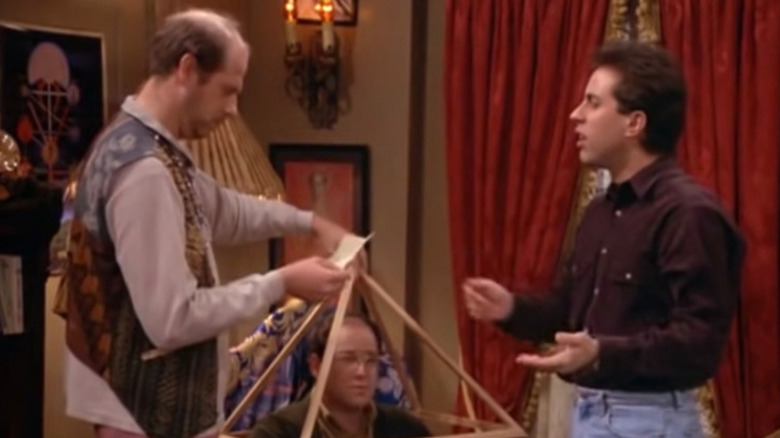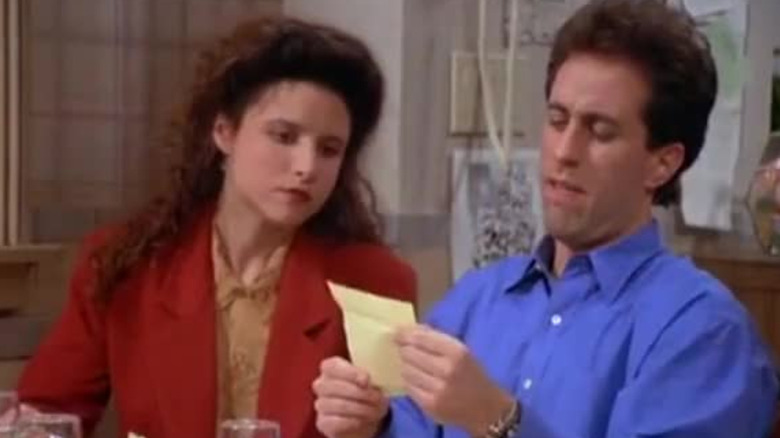This Seinfeld Episode Made A Shockingly Accurate Prediction
Films and television shows making wild predictions that end up coming true have become a pop-culture obsession over the last half-decade, and there are some really high-profile examples of our favorite characters on the small screen mentioning a topic that suddenly becomes a massive deal in everyone's lives. However, more often than not, the shows in question are just referencing historical events that the writers recall and decide to put into the scripts for their own amusement. In the case of "Seinfeld," a random basketball score that was mentioned during an episode ended up becoming a fascination on NBA Twitter for a couple of nights, and it sparked a bizarre moment on social media.
Back in 2019, the National Basketball Association's Cleveland Cavaliers would take on the San Antonio Spurs in a routine contest, but a regular game suddenly became an internet fixation because of the final score. The Cavs would go on to win 117 to San Antonio's 109 in a rare bright spot for the sputtering Cleveland club, and usually nothing else would come of that. That was until "Seinfeld" fans who loved basketball discovered the score. In 1991, an episode of the beloved sitcom, called "The Heart Attack," Stephen Tobolowsky's one-off character Tor Eckman is tasked with translating a note that Jerry scrawled for himself while watching a science fiction movie. Of course, because this is "Seinfeld," Tor is a holistic healer who reads "Cleveland 117 – San Antonio 109" on the piece of paper from Jerry.
So, social media did its thing, and people from outside the sports bubble on Twitter got hold of the weird little nugget, and we were off to the conspiracy races. It wasn't hard for a random topic to get a full gust of wind at its back and sail over to the larger internet back then, and it certainly wouldn't be the last time it happened about "Seinfeld" in particular. Heck, one year earlier, the entire sports side of that particular platform ground to a halt because two Pittsburgh Pirates players were named Newman and Kramer. Pop culture acumen is a necessity for running popular accounts all over social media, so there had to be a "Seinfeld" fan paying attention out there somewhere.
Seinfeld predicted an NBA score 28 years before it happened
28 years after the fact is a bizarre part of this whole deal, and a great example of how social media puffs these occurrences up randomly because they didn't state that the game would be from the future, and the writers likely just put two random teams in there for comedic effect. That fact isn't going to stop people from speculating and having a little fun with the randomness of that score popping up out in the wild; it's a whole cottage industry on the larger online sports community, with Scorigami in the NFL.
Still, some sides of this whole "X Show Predicted This Exact Thing" can be a little bit dubious, and there's no better example out there than "The Simpsons," maybe the textbook example of a "media prediction" in our current landscape. During the middle months of 2020, when everyone was preoccupied by ... let's say a bunch of things going on in the world (Dear goodness, what a time), a bunch of internet posters started focusing on how many seemingly unrelated events "The Simpsons" seemed to predict. There are smaller scale things like Germany and Brazil in the World Cup or Fox merging with Disney, but things get a little more hairbrained on the internet when you mention that a President Trump was referenced in a season 11 episode or an entire plotline with "The Osaka Flu" (mentioned in "Marge in Chains" from season 4.)
People trying to grapple with strange occurrences has been a thing long before we had television sets, or even electricity, as it might be the most human impulse on Earth to try and explain what's happening around us. But the advent of social media makes all of this even more dicey than it can be on its own, with the speed that speculation travels and the frankly herculean effort it takes to fact-check and correct falsehoods once those particular trains leave the station. Harmless little jokes about history repeating itself or a TV show randomly getting an exact detail right become something more sinister with very little effort.
The problem with predictions
It's nice to have a bit of fun with moments where the media we love ends up reflected in our real world, in fact, those kinds of overlaps end up bringing more awareness to shows and movies that a lot of us know like the backs of our hands. But, there's nothing nefarious or conspiratorial about a TV show getting something right, and we'd do well to understand that fact before jumping on social media talking about "this thing was predicted!" One of "The Simpsons" writers, Bill Oakley, put it well in an interview with The Hollywood Reporter:
"There are very few cases where 'The Simpsons' predicted something. It's mainly just coincidence because the episodes are so old that history repeats itself. Most of these episodes are based on things that happened in the '60s, '70s or '80s that we knew about."
History often cycles and repeats in strange ways in numerous locations, and that's just a weird part of life on this little blue rock, but it's often anything but predictable. Sadly, that fact is a lot less juicy than the idea that there's some secret machine giving out the information beforehand like a Grays Sports Almanac from "Back to the Future II," and that can be tough for people to wrap their brains around. Fortunately, there's always something new to discover, and you never know when your obscure pop culture knowledge is going to come in handy. Chances are, you won't be able to predict when.


